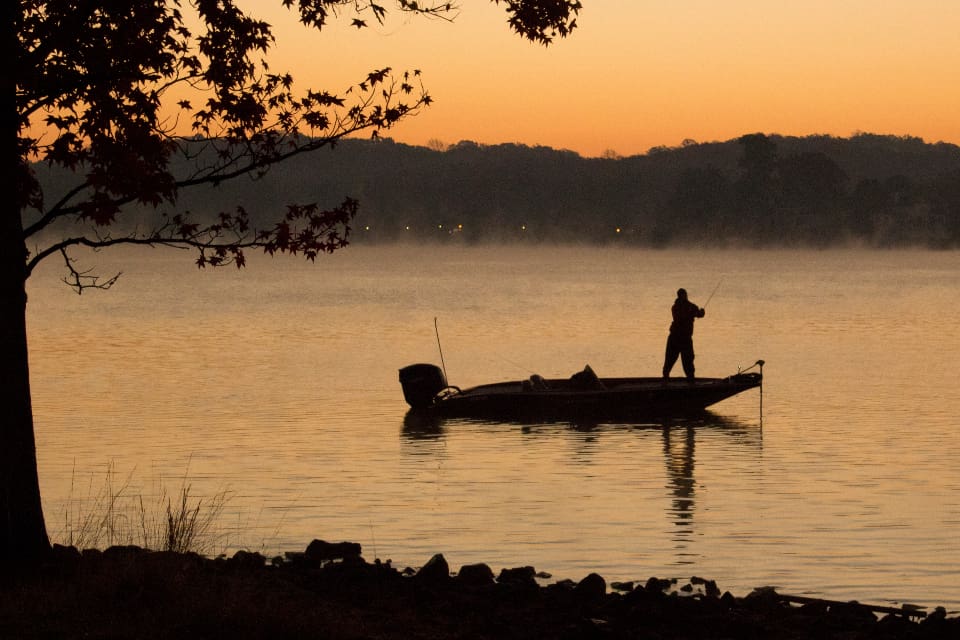Why are boating laws in Arkansas important to know? Because boating on Arkansas’ lakes and fishing its rivers can be so much fun. And boating in the Natural State is on the rise! Whether you’re an experienced boater looking for additional information or new to our waterways, let’s dive into everything you need to know about boating in Arkansas.
In 2008, there were just over 184,000 registered boats. However, by 2024 the number of registered boats in the Natural State nearly doubled. There are approximately 342,000 registered boats in Arkansas.
How popular is boating in the Natural State? Arkansas ranks 12th for the number of boats per population in the U.S.
Boating is an excellent chance to find a new hobby, make new friends, or learn something new. However, before getting out on the waters in Arkansas, you’ll need to know everything about Arkansas’ boating laws. It might look like fun at first, but risks come with boating, hence why you need to educate yourself beforehand.
Let’s tackle boating laws in Arkansas:
Boating Requirements in Arkansas
After acquiring your boating license, it’s time to familiarize yourself with your boat and Arkansas’s waterway boating laws.
Registering Your Boat in Arkansas
First up, you must register your boat in Arkansas, and it must be within 30 days of your purchase. You must also obtain an Arkansas Certificate of Number and valid credentials. These boating credentials must be on board with you at all times.
Your Arkansas boating registration is good for three years before needing renewal.
Exemptions to these registration rules include but aren’t limited to human-powered boats and boats documented by the Coast Guard.
Do I Have to Take Boater’s Education in Arkansas?
To operate a motorboat or sailboat in Arkansas, a boating education course is mandatory for anyone born on or after January 1, 1986.
But it’s recommended every one, regardless of age, take a boating education course who plans to operate a motorboat, sailboat, canoe, or kayak.
You can sign up online for an Arkansas Boater’s Education Course.
Does It Cost Money to Take a Boater’s Education Course in Arkansas?
It’s free to take an in-person boater’s education course in Arkansas. Courses typically last 3 to 4 nights. However, if you choose to take the online course, you’ll pay between $35 to $50.
Luckily, your boater education card is good for life!
Do I Have to Register My Boat When Visiting Another State?
If you’re visiting an Arkansas lake, you do not have to register your boat in Arkansas.
Boats that have been registered in another state or country and are only using Arkansas waters for under 90 days do not have to be registered in the Natural State. However, if you’re visiting another of the 49 states it’s best that you check with the boating laws for that state.

What To Do If I Sell or Lose My Boat
If something bad were to happen to your boat, the Department of Finance and Administration must be notified within 15 days if it was destroyed, lost, or abandoned. If selling your boat, you must also notify the Department of Finance and Administration within 30 days of transfer of the ownership (Campfire Collective).
After going through all these proper channels, it’s finally time to get out on the water. Before even putting your boat in the water, you must first make sure that your boat and all equipment are in good working order together.
Life Jacket Laws in Arkansas
According to Arkansas boating laws, there must be one life jacket per person on board at all times.
Children 12 and under must be in their life jackets at all times while on the water.
Additionally, a life jacket must be worn while operating a personal watercraft in Arkansas. Personal watercraft include jet skis and Sea-Doos.
Arkansas Drinking & Boating Laws
While on the lake or river, it might seem fun to drink and have fun with your friends but in the state of Arkansas, it’s illegal to operate any motorized water vehicle while under the influence.
The penalties for boating under the influence are the same as the penalties for a DUI. Your first offense could leave you with up to a $1,000 fine, a six-month license suspension, and a year in jail.
Drinking and driving on a boat is as dangerous as drinking and driving a vehicle.
Do Boats Have Speeding Laws?
It’s also not permitted to anyone, no matter the age, to drive a boat at any speed that creates a hazardous wash or wake while passing other boats. Hazardous wakes are enough to sink some boats if big enough and can be especially dangerous.
In this case, it’s illegal to drive anything over the “no wake speed” signs when 100 feet or closer to recreation areas, docks, piers, floats, dams, anchored boats, intake structures, or other obstructions.
Age Requirements for Operating a Boat
There are 2 main points for boating age laws here in Arkansas, according to the Arkansas Game & Fish Commission:
- For engines with 10+ horsepower, you must be at least 12 years of age AND be under the direct supervision of someone at least 18 years of age.
- For any personal watercraft, you must be 16 years or older to operate alone. Drivers aged 12 to 15 years old must be under direct supervision of someone 18 years or older. Anyone with a personal watercraft under the age of 12 years old must be under the direct supervision of someone 21 years and up.

To receive your Arkansas boating license you must take and pass a boating class. Once you get your boating license, the good news is that it never expires. However, if you lose it, you can reorder one HERE.
Who Enforces the Law on Arkansas Waterways?
Obviously, the lake or the river isn’t like a regular roadway. So you may be wondering, who is the law of the land while off-land? Well, there are multiple answers to this question:
Arkansas Game & Fish
First and foremost, the main ones to listen to out on the water are the Arkansas Game & Fish Commission. They make all the rules for all natural things and since there is wildlife in the lakes and rivers, they take waterways and water safety very seriously.
Arkansas County Sheriff
Next, you must listen to all sheriffs and deputy sheriffs from the county that you are currently in while on the water.
Arkansas State Police
After these enforcements, you also are following the orders of the Arkansas State Police officers.
Department of Parks & Tourism and the Coast Guard
Though you’re much less likely to encounter these in Arkansas, the law may be enforced by the Enforcement Officers of the Department of Parks and Tourism and the Coast Guard. The Coast Guard is more so seen in states that border oceans and bigger waterways.
What Are the Illegal Boating Laws in Arkansas?
You may be wondering, “What could I get in trouble for?” while on the water in Arkansas. Well, the following list covers it all: It’s illegal to do any of the following in a harmful manner that might endanger the life, limb, or property of another:
- Operating a boat in a designated swimming area.
- Weaving through congested traffic at a dangerous speed.
- Jumping another boat’s wake too close to the other boat.
- Waiting until the last possible second to avoid a collision.
- Hazardous wake creation.
- Harassing/disturbing wildlife.
- Riding on your boat’s stern, bow, gunwales, or transom.
- Overloading a boat’s safe carrying capacity.
- Going over your boat’s safety recommended horsepower.
- Waterskiing in restricted areas or obstruction areas.
Boating Accident Reporting
What do I do if I’m in a boating accident? Do I have to report a boating accident to the authorities? When an accident happens on Arkansas waterways, there are specific requirements to follow:
- First, stop your boat immediately and stop it at the scene of the accident.
- Second, assist anyone injured from the accident unless it would seriously injure another party.
- After everyone’s safety is ensured, you’re required to exchange information with the owner, including a list of damaged property and anyone injured in the incident. Information includes your name, address, and vessel ID.
- If an injury has occurred, you must notify Arkansas Game & Fish or the local sheriff’s department if the injuries and/or damage are over $2,000 or if someone’s injuries result in death or disappearance.
Are There Different Federal Boating Laws?
The short answer is yes! The long answer varies though. Federal boating laws are created by the Coast Guard. Lots of federal laws end up being the same as the state laws. However, some different federal laws include, but aren’t limited to the following:
- Navigation Rules,
- Right of Way Rules,
- Aids to Navigation,
- Boat Documentation,
- Boat Safety Equipment Requirement,
- Emergency Notification and Communication,
- Pollution Regulations.
Boating Safety Tips
Check out our 5 TIPS for BOATING SAFETY in ARKANSAS. We cover some expected tips like “wear a life jacket” and “don’t drink while driving” but we also have tips we haven’t covered yet in this blog.
Injured in an Arkansas Boating Accident
Roughly 70 to 80 boat accidents occur in Arkansas each year. A “boating accident” refers to any accident that involves personal injury requiring medical treatment. Not included are nonreported accidents or incidents not involving personal injury.
The number of boating accidents in Arkansas has climbed in recent years. More and more people are on Arkansas’ lakes and rivers, but fewer and fewer boaters are properly educating themselves and following Arkansas’ boating laws.
Taylor King Law represents individuals who have been injured in a boating accident. If you’ve been involved in an accident on the water in Arkansas, visit our Boat Accident page or contact us online. We’ll be on your side, by your side.
Author: Chloe Veuleman
